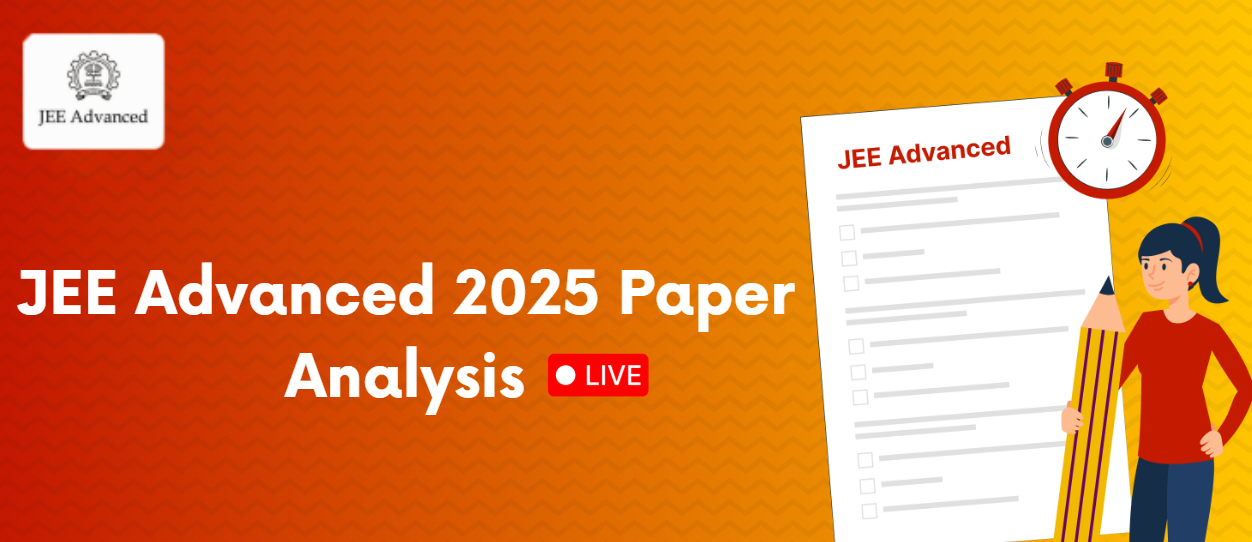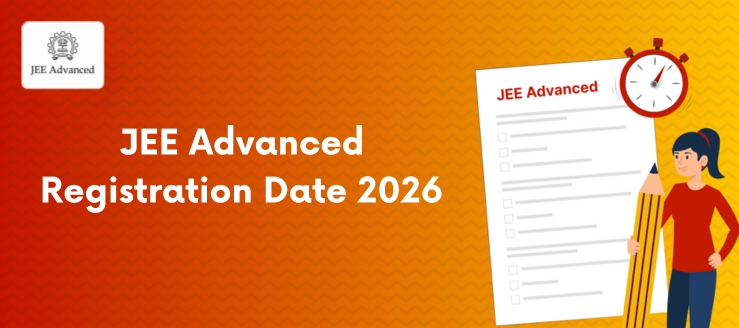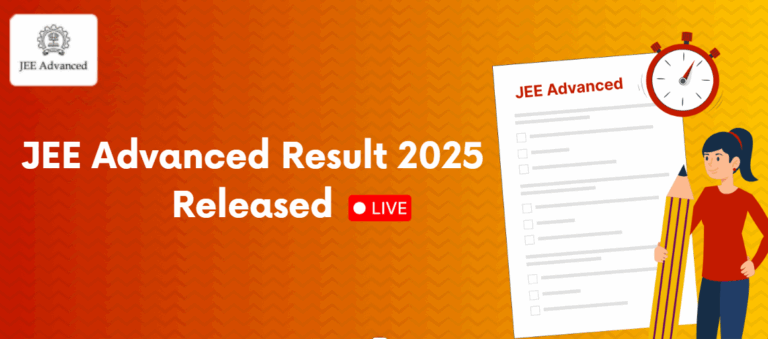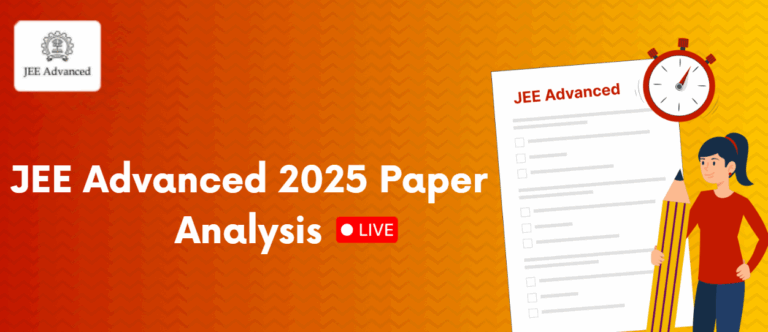Summarise With AI

The JEE Advanced 2025 was conducted on May 18 in two shifts — the first from 9:00 AM to 12:00 PM and the second from 2:30 PM to 5:30 PM. The overall difficulty level of the Second shift was tougher than that of Shift 1. Mathematics once again proved to be the toughest section. It featured complex problems, lengthy calculations, and required a deep understanding of core concepts. Physics was considered moderate to complex; the Physics section had a mix of conceptual and analytical questions. Some students found it time-consuming due to tricky problem statements. The chemistry section was relatively balanced, with many NCERT-based questions.
Want a detailed breakdown of the paper?
Check out our blog for in-depth insights into the JEE Advanced 2025 Paper Analysis, topic-wise weightage, and real-time student reactions!
JEE Advanced 2025 Exam Overview
Below is the exam overview of JEE Advanced 2025.
| Exam Particulars | Exam Details |
| Total Papers | 2 (Paper 1 and Paper 2) |
| Subjects | Physics, Chemistry, Mathematics |
| Medium of Exam | English and Hindi |
| Questions per Paper | Varies each year (typically around 54–60 questions per paper) |
| Total marks of JEE Advanced | 180 marks (may vary slightly depending on pattern) |
| Marking Scheme | Varies by section: Includes full, partial, and negative marking |
| Mode of Exam | Computer-Based Test (CBT) |
| Duration | 3 hours per paper (6 hours total for both papers) |
| Total Duration | 6 hours (Paper 1: Morning shift, Paper 2: Afternoon shift) |
| Subjects to Attempt | All three (Physics, Chemistry, and Mathematics are mandatory) |
Where to Check JEE Advanced Question Papers
Candidates can easily access JEE Advanced Previous Year Question Papers through the CollegeDost WhatsApp bot.
Step-by-Step Guide:
Step 1: Click here to access the CollegeDost WhatsApp bot.
Step 2: Once the bot opens, enter your basic details like your name and college or school name, if prompted.
Step 3: From the main dashboard/menu, select an option such as “JEE Advanced 2025”.
Step 4: To access the JEE Advanced Papers, Click on “JEE Adv View More”.
Step 5: From the Options, Select “JEE Advanced PYQ”.
Step 6: You will now be able to download the Papers.
Note: If you’re already registered with CollegeDost, you can directly click on the CollegeDost WhatsApp bot link and check the question papers via WhatsApp.
Where to Check JEE Advanced 2025 Exam Analysis
CollegeDost presents a comprehensive, shift‑wise breakdown of the JEE Advanced 2025 examinations, offering in‑depth insights into Physics, Chemistry, and Mathematics and live student reactions. Since the first session on May 18, our specialists have analysed memory‑based papers to assess question trends, difficulty gradations, and crucial concepts.
Check out the Link Below to know more about the JEE Advanced paper Analysis
👉 Check JEE Advanced 2025 Exam Analysis on CollegeDost
JEE Advanced 2025 Exam Shift Timings
Check the JEE Advanced 2025 exam shift timings in the table below.
| JEE Advanced 2025 Slot Time for 18th May | Reporting Time | Gate Closing Time | Shift Timing |
| JEE Advanced Shift 1 | 7 AM | 8.30 AM | 9 AM to 12 PM |
| JEE Advanced Shift 2 | 1 PM | 2.30 PM | 3 PM to 6 PM |
JEE Advanced 2025 Exam Analysis: Based on Number of Attempts
Candidates can check the number of good attempts that they can expect in the exam from the following table.
| Subjects | Good Attempts (Out of Total) | Difficulty Level | Key Topics Covered |
| Physics | 35–40 | Moderate | Mechanics (Rotation, SHM), Electrodynamics, Modern Physics, and some tricky numerical problems |
| Chemistry | 38–42 | Moderate | Organic: Named Reactions, IUPAC; Inorganic: NCERT-based theory; Physical: Mole Concept, Thermodynamics |
| Mathematics | 30–36 | Moderate to Difficult | Calculus (Definite Integration, Limits), Algebra (Matrices, Complex Numbers), Coordinate Geometry, lengthy calculations |
Also Check : JEE Advanced Rank Predictor
JEE Advanced 2025 Exam Analysis: May 18 2025, Shift 2
The JEE Advanced 2025 Shift 2 exam, held on May 18, was tough. Physics was considered the trickiest of the three, with conceptual and application-based questions dominating the section. Topics like Mechanics, Electrostatics, and Modern Physics had a significant presence, requiring strong problem-solving skills and time management. Chemistry had a balanced mix of Physical, Organic, and Inorganic sections, with questions testing both NCERT-level understanding and deeper application. Organic Chemistry featured reaction mechanisms and named reactions, while Inorganic leaned more on direct factual recall.
Mathematics was lengthy and calculation-intensive, with many students finding it time-consuming and tough. Questions from Algebra, Coordinate Geometry, and Calculus were prominent, with multiple integrals and matrix-based problems posing challenges. Several candidates noted that understanding the question structure and avoiding silly mistakes was crucial to scoring well. Overall, Shift 2 of JEE Advanced 2025 tested theoretical knowledge, speed, accuracy, and conceptual clarity.
| Subject | Class 11 Topics (%) | Class 12 Topics (%) |
| Physics | 44% | 56% |
| Chemistry | 31% | 69% |
| Mathematics | 31% | 69% |
JEE Advanced 2025 Mathematics Paper Analysis
As reported by most candidates, the Mathematics section in JEE Advanced 2025 (Shift 2) proved to be the most difficult among all three subjects. The questions were lengthy, involved complex calculations, and required a strong conceptual understanding, especially in topics like Definite Integrals, Matrices, and Complex Numbers. Calculus-based problems were multi-step and time-consuming, particularly on the area under the curve and the application of derivatives. Algebra also featured prominently, with matrices and complex numbers making up a substantial portion of the paper. High-weightage topics such as Probability, 3D Geometry, Circles, and Permutations & Combinations added to the diversity of the section, but often came with tricky options and multiple layers of reasoning.
| Particulars | Details |
| Overall Difficulty Level | Difficult |
| Most Challenging Topics | Calculus (Definite Integration, Area under Curve), Algebra (Complex Numbers, Matrices) |
| Moderate Topics | Coordinate Geometry, Sequences & Series |
| Easiest Topics | Probability, Basic Trigonometry |
| Question Types | MCQs (Single Correct), MCQs (One or More Correct), Integer-type Questions |
| Key Chapters Covered | Matrices, Complex Numbers, Application of Derivatives, Integration, Vectors |
| Lengthiness | High – Several multi-step and calculation-heavy questions |
| Common Student Feedback | Time-consuming, tricky options, algebra-heavy, moderate to low scoring for most students |
JEE Advanced Mathematics Chapterwise Weightage
Calculus, Algebra, and Coordinate Geometry have the most number of questions and weightage, with emphasis on topics like Matrices, Determinants, and Complex Numbers.
| Topic/Chapter Name | No of Questions | Weightage (%) |
| Class-12 | 81 | 68% |
| Differential Calculus | 10 | 8% |
| Application of Derivatives | 3 | 3% |
| Limit | 3 | 3% |
| Functions | 4 | 3% |
| Integral Calculus | 23 | 19% |
| Differential equation | 4 | 3% |
| Definite integration | 19 | 16% |
| Matrix & Determinants | 10 | 8% |
| Probability | 17 | 14% |
| Trigonometry | 8 | 7% |
| Inverse Trigonometric function | 8 | 7% |
| Vector and 3D | 13 | 11% |
| Vector | 3 | 3% |
| Three-Dimensional Geometry | 10 | 8% |
| Class-11 | 39 | 33% |
| Complex Numbers | 11 | 9% |
| Coordinate Geometry | 11 | 9% |
| Circle | 4 | 3% |
| Parabola | 3 | 3% |
| Ellipse | 4 | 3% |
| Trigonometry | 6 | 5% |
| Solution of Triangle | 6 | 5% |
| Sequence & Series | 4 | 3% |
| Sequence & Series | 4 | 3% |
| Statistics | 3 | 3% |
| Binomial Theorem | 4 | 3% |
| Total | 120 | 100 |
JEE Advanced 2025 Physics Paper Analysis
Most students rated the physics section in JEE Advanced 2025 Shift 2 as moderate to challenging. The paper tested both conceptual understanding and numerical problem-solving skills. Topics such as Electrostatics, Sound Waves, Optics, and Mechanics dominated the section and required multi-step calculations, precise interpretation, and strong foundational knowledge. Questions were application-based, mainly demanding logical reasoning and familiarity with core physics principles rather than rote memorisation.
| Particulars | Details |
| Overall Difficulty Level | Moderate to Difficult |
| Most Challenging Topics | Electrostatics, Sound Waves, Optics, Mechanics |
| Moderate Topics | Thermodynamics, Modern Physics |
| Easiest Topics | Units & Dimensions, Measurement & Errors |
| Question Types | MCQs (Single Correct), MCQs (Multiple Correct), Integer-type Questions |
| Key Chapters Covered | Electrostatics, Sound Waves, Optics, Mechanics, Thermodynamics, Modern Physics |
| Lengthiness | High – Several questions involved lengthy calculations, making time management crucial |
| Common Student Feedback | Students found the Physics section time-consuming due to complex calculations, especially in Electrostatics and Mechanics. The significant conceptual depth required added to the challenge. |
JEE Advanced Physics Chapterwise Weightage
Mechanics carry the highest weightage, making up about 38% of the paper. From Class 12, Electricity & Magnetism and Modern Physics were the most frequently asked topics.
| Topic/Chapter Name | No. of Questions | Weightage (%) |
| Class 12 | 47% | |
| Modern Physics | 4 | 12% |
| Optics (Geometrical & Physical) | 3 | 9% |
| Electricity & Magnetism | 6 | 18% |
| Capacitance | 2 | 6% |
| Alternating Current | 1 | 3% |
| Electromagnetic Induction | 1 | 3% |
| Electrostatics | 1 | 3% |
| Electromagnetic Field | 1 | 3% |
| Electromagnetic Waves | 1 | 3% |
| Unit & Dimensions, Measurement & Errors | 1 | 3% |
| Class 11 | 53% | |
| Mechanics | 13 | 38% |
| Centre of Mass | 2 | 7% |
| Rigid Body Dynamics | 2 | 5% |
| Sound Waves | 2 | 5% |
| Fluid Mechanics | 2 | 5% |
| Simple Harmonic Motion | 1 | 3% |
| Surface Tension | 1 | 3% |
| Rectilinear Motion & Vectors | 2 | 7% |
| String Wave | 1 | 3% |
| Thermal Physics | 4 | 12% |
| Kinetic Theory of Gases & Thermodynamics | 4 | 12% |
| Unit & Dimensions, Measurement & Errors | 1 | 3% |
| Total | 34 | 100% |
JEE Advanced 2025 Chemistry Paper Analysis
The Chemistry section in JEE Advanced 2025 Shift 2 was considered the most approachable and scoring among the three subjects. Most questions were direct and closely aligned with the NCERT syllabus, which helped students attempt them with confidence. Physical Chemistry mainly consisted of straightforward numerical problems, requiring quick calculations and accuracy. Organic Chemistry focused on reaction mechanisms, named reactions, and functional group transformations, testing students’ conceptual clarity and memorisation.
| Particulars | Details |
| Overall Difficulty Level | Easy to Moderate |
| Most Challenging Topics | Physical Chemistry (Electrochemistry, Thermodynamics) |
| Moderate Topics | Organic Chemistry (Reaction Mechanisms, Named Reactions) |
| Easiest Topics | Inorganic Chemistry (Periodic Table, Chemical Bonding) |
| Question Types | MCQs (Single Correct), MCQs (Multiple Correct), Integer-type Questions |
| Key Chapters Covered | Electrochemistry, Thermodynamics, Reaction Mechanisms, Periodic Table, Chemical Bonding |
| Lengthiness | Low – Questions were generally straightforward and less time-consuming |
| Common Student Feedback | The Chemistry section was considered the most scoring among all three subjects. Questions were largely based on NCERT, with a balanced distribution across Physical, Organic, and Inorganic Chemistry. |
JEE Advanced Chemistry Chapterwise Weightage
The Chemistry section has a balanced mix of Physical, Organic, and Inorganic Chemistry. Key chapters include the Periodic Table, Coordination Compounds, Thermodynamics, and Chemical Bonding.
| Chapter Name | Number of Questions | Weightage (%) |
| Alkyl Halides | 1 | 3.3% |
| Aromatic Compounds | 1 | 3.3% |
| Atomic Structure | 2 | 6.6% |
| Carbohydrates, Amino Acids, and Polymers | 1 | 3.3% |
| Carboxylic Acids & Their Derivatives | 1 | 3.3% |
| Chemical and Ionic Equilibrium | 2 | 6.6% |
| Chemical Bonding | 2 | 6.6% |
| Chemical Kinetics | 1 | 3.3% |
| Electrochemistry | 1 | 3.3% |
| General Organic Chemistry | 1 | 3.3% |
| Hydrocarbon | 1 | 3.3% |
| Mole Concept | 1 | 3.3% |
| Nuclear & Environmental Chemistry | 2 | 6.6% |
| Periodic Table, s and p-Block Elements | 3 | 9.9% |
| Redox Reactions | 1 | 3.3% |
| Solid-State and Surface Chemistry | 2 | 6.6% |
| Solution & Colligative Properties | 1 | 3.3% |
| Stereochemistry | 1 | 3.3% |
| Thermodynamics & the Gaseous State | 2 | 6.6% |
| Transition Elements & Coordination Compounds | 3 | 9.9% |
Student Reviews For JEE Advanced 2025 May 18th Shift 2 Exam
Physics
Difficulty Level: Moderate to Difficult
Feedback:
Students reported that the Physics section was conceptually deep and time-intensive, especially in topics like Electrostatics, Mechanics, Sound Waves, and Optics. Several multi-step calculation problems required careful reasoning and time management. While core principles were well-tested, the paper’s complexity pushed many to spend extra time on these questions, making it one of the tougher sections in this shift.
Chemistry
Difficulty Level: Easy to Moderate
Feedback:
Chemistry remained the most approachable section in Shift 2 as well, with many questions directly based on NCERT concepts and examples. The straightforward nature of Physical Chemistry numericals, combined with balanced coverage of Organic and Inorganic Chemistry, helped students gain confidence. The section was perceived as scoring and less time-consuming compared to Physics and Mathematics.
Mathematics
Difficulty Level: Difficult
Feedback:
Mathematics was widely regarded as the toughest part of the exam. Questions on Calculus (Definite Integration, Area under Curve), Algebra (Matrices, Complex Numbers), and Probability were lengthy and conceptually challenging. The paper required not only strong conceptual clarity but also efficient problem-solving under time pressure. Many students found this section algebra-heavy and time-consuming, impacting overall performance.
Overall Feedback
Shift 2 of JEE Advanced 2025 was perceived as more challenging than Shift 1, with a greater emphasis on complex problem-solving and multi-step questions, especially in Mathematics and Physics. The paper tested students’ conceptual depth, speed, and accuracy more rigorously than previous years, making time management a crucial factor for success.
JEE Advanced 2025 Dress Code Guidelines
Candidates taking the JEE Advanced 2025 exam must adhere to a clearly defined dress code to maintain fairness and prevent malpractice. The clothing should be simple and free of unnecessary embellishments. Below are the key rules to follow:
| Dress Code Guideline | Details |
| Top Wear | Plain, light-colored shirts or T-shirts without patterns, logos, or extra pockets. |
| Sleeves | Only half-sleeves allowed; full sleeves are strictly not permitted. |
| Layered Clothing | Jackets, hoodies, shawls, or layered clothing are not allowed. |
| Design Elements | Clothes must not include large buttons, metallic threads, or hidden pockets. |
| Footwear | Open footwear like slippers or sandals is allowed; shoes and boots are banned. |
| Watches | Digital and analog watches are not allowed inside the exam hall. |
| Jewelry | Earrings, rings, bracelets, chains, and all types of jewelry are prohibited. |
| Items to Carry | Only bring your admit card, a valid photo ID, and essential stationery. |
JEE Advanced 2025 Syllabus Overview
The JEE Advanced syllabus covers advanced topics in Physics, Chemistry, and Mathematics, demanding a deeper conceptual understanding than JEE Main. To prepare effectively, students need to take a strategic approach to both Class 11 and 12 topics.
For a topic-wise breakdown and updated list, refer to the CollegeDost JEE Advanced Syllabus Blog, a reliable source for planning your studies.
👉 Check the JEE Advanced Syllabus Here.
JEE Advanced 2025 Result Details
The JEE Advanced 2025 results are expected to be released by IIT Kanpur on June 2, 2025, following the exam held on May 18, 2025. This year’s test included two rigorous papers covering core subjects: Physics, Chemistry, and Mathematics.
Many test-takers described the paper as moderately tough, with Mathematics being the most demanding subject. Prior to the results, candidates will receive their response sheets and a provisional answer key, with the option to raise objections.
Once the final result is out, students can view their scores, All India Ranks (AIRs), and qualification status on the official JEE Advanced portal. These results will determine IIT admissions and eligibility for JoSAA counselling, which begins on June 3, 2025.
Quick Recap of JEE Advanced 2024
The JEE Advanced 2024 exam was a key milestone for IIT aspirants across the country. With over 1.87 lakh candidates appearing on May 26, 2024, the competition was intense. The two-paper exam tested candidates on advanced concepts from Physics, Chemistry, and Mathematics.
The results were officially declared on June 9, 2024. Ved Lahoti, representing the IIT Delhi zone, emerged as AIR one JEE Advanced 2024.
Regarding the JEE Advanced 2024 cutoff, the General category minimum was 23.89%, while reserved categories (EWS, OBC, SC, ST, PwD) had slightly lower thresholds. These cutoffs were critical in determining who advanced to the JoSAA counselling process and received IIT seat allocations.
Frequently Asked Questions
1. What was the overall difficulty level of JEE Advanced 2025 Shift 2?
Candidates described the paper as moderately challenging, with Mathematics being the most demanding section. While physics included tricky numerical questions, chemistry was more direct and relatively more straightforward to tackle, especially for those well-versed in NCERT textbooks.
2. Which subject was the toughest in JEE Advanced 2025 Paper 2?
Most students agreed that Mathematics posed the most significant challenge. Questions were lengthy and involved multiple steps, especially in areas like Calculus, Matrices, and Complex Numbers, which tested both speed and depth of understanding.
3. Which Physics topics were complicated in JEE Advanced Paper 2?
In Physics, questions from topics such as Electrostatics, Optics, Sound Waves, and Mechanics were reported to be time-consuming and conceptually deep. Many problems required combining multiple concepts to reach the correct answer.
4. What was the exam pattern like in Paper 2?
The exam followed the standard JEE Advanced format, combining single/multiple correct MCQs and integer-type questions. Many problems required detailed calculations, and success depended heavily on time management and problem-solving efficiency
5. Was Shift 2 more difficult than Shift 1?
According to many students and educators, Shift 2 was slightly more challenging than Shift 1. The questions were more analytical, especially in Physics and Maths, and demanded more critical thinking compared to the earlier session.







